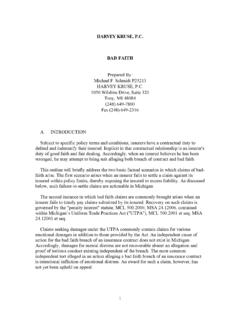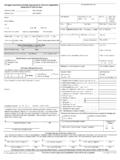Transcription of SYNOPSIS OF MICHIGAN NO-FAULT LAW - Harvey Kruse, P.C.
1 SYNOPSIS OF MICHIGAN NO-FAULT LAW PREPARED BY: WILLIAM F. RIVARD, ESQ. TROY OFFICE GRAND RAPIDS OFFICE 1050 WILSHIRE DRIVE, SUITE 320 3210 EAGLE RUN DRIVE NE, SUITE 204 TROY, MI 48084 GRAND RAPIDS, MI 49525 PHONE: (248) 649-7800 PHONE: (616) 771-0050 FAX: (248) 649-2316 FAX: (616) 776-3646 CONTACT: MICHAEL SCHMIDT CONTACT: DENNIS P. FLYNN EMAIL: EMAIL: FLINT OFFICE 5206 GATEWAY CENTRE, SUITE 200 FLINT, MI 48507 PHONE: (810) 230-1000 FAX: (810) 230-0844 CONTACT: MICHAEL GUSS EMAIL: August, 2017 -i- Harvey KRUSE, TABLE OF CONTENTS I. MCL - MANDATORY INSURANCE .. 1 A. MCL (1) - Security for Payment of Benefits .. 1 II. MCL AND MCL PERSONAL PROTECTION INSURANCE .. 1 A. MCL - Personal Protection Benefits .. 1 B. MCL (1) Statute of Limitations .. 2 III. MCL PARKED VEHICLES .. 3 A. MCL (1) Unreasonably Parked Vehicles.
2 3 B. MCL (2) Course of Employment Parked Vehicles .. 5 IV. MCL ALLOWABLE EXPENSES, WORK LOSS, AND ATTENDANT CARE .. 6 A. Introduction Questions to Consider .. 6 B. MCL (1)(a) Allowable Expenses .. 6 C. MCL (1)(b) Work Loss .. 10 D. MCL (1)(c) Personal/Replacement Services .. 14 V. MCL GOVERNMENTAL BENEFITS SETOFFS .. 16 A. Introduction .. 16 B. MCL (1) Setoff of Government Benefits .. 16 C. MCL (3) Deductible Coverage Provisions .. 17 VI. MCL COORDINATION OF BENEFITS/OTHER HEALTH AND ACCIDENT COVERAGE .. 18 A. MCL .. 18 VII. MCL PERSONS NOT ENTITLED TO PERSONAL PROTECTION INSURANCE BENEFITS .. 20 A. MCL (a) Unlawful Use .. 20 B. MCL (b) Uninsured Owner/Registrant .. 21 C. MCL (c) Non- MICHIGAN Resident .. 21 -ii- Harvey KRUSE, VIII. MCL AND MCL PRIORITY PROVISIONS .. 22 A. MCL (1) General Priority Rule.
3 22 B. MCL (2) and (3) Exceptions .. 22 C. MCL (4) Occupants of Motor Vehicles .. 23 D. MCL (5) Motorcyclists .. 23 E. MCL (1) & (2) Pedestrians/Bicyclists/Other Non-Occupants .. 23 IX. MCL AND MCL PROPERTY PROTECTION INSURANCE .. 24 A. MCL Property Protection Benefits .. 24 B. MCL Property Protection Benefits Exclusions .. 26 C. MCL (2) Property Protection Statute of Limitations .. 26 X. MCL MCL PROCEDURE FOR QUESTIONING CLAIMS FOR PERSONAL AND PROPERTY PROTECTION INSURANCE BENEFITS .. 27 A. MCL Mandatory Mental or Physical Independent Examinations .. 27 B. MCL IME Reports and Waiver of 27 C. MCL Refusal to Submit to IME or to Make Records Available .. 27 D. Examination Under Oath .. 28 XI. MCL (3)(d), (4), (5), AND (6) 28 A. Introduction .. 28 B. Applicability of Mini-Tort .. 29 XII. COLLISION DAMAGE.
4 30 XIII. MCL - CERTIFICATION .. 31 -1- Harvey KRUSE, I. MCL MANDATORY INSURANCE A. MCL (1) Security for Payment of Benefits (1) The owner or registrant of a motor vehicle required to be registered in [ MICHIGAN ] shall maintain security for payment of benefits under personal protection insurance, property protection insurance, and residual liability insurance. Security shall only be required to be in effect during the period the motor vehicle is driven or moved upon a highway. (2)(g) An owner means: (i) a person renting or having the use of a motor vehicle for a period that is greater than 30 days; (ii) a person who holds the legal title to a vehicle , other that a person engaged in the business of leasing motor vehicles as a lessor pursuant to a lease providing for the use of the motor vehicle by the lessee for a period that is greater than 30 days; or (iii) a person who has the immediate right of possession of a motor vehicle under an installment sales contract.
5 Comments In Clevenger v. Allstate Ins., 443 Mich. 646 (1993), the MICHIGAN Supreme Court held that the insurer of the insured vehicle owner, who had just sold the motor vehicle to her nephew but had left her license plates on the motor vehicle , remained liable as to the seller as the named insured and to the buyer as a permissive driver. The insurance policy did not require the named insured to have legal title to the vehicle , nor did it terminate coverage upon a transfer of title. Because the insured voluntarily remained the registrant of the vehicle , the court presumed that she complied with the statutory duty to insure it during the brief period she permitted the new owner to operate it on a public highway. In Twichel v. MIC Gen. Ins. Corp., 469 Mich. 524 (2004), the MICHIGAN Supreme Court held that the purchaser of a truck was the owner under MCL (2)(g)(i), even though the purchaser had paid only half of the sale price, title had not transferred, and the motor vehicle was not used for a 30-day period before the accident.
6 Because the arrangement contemplated a permanent transfer of ownership, and that the purchaser would have exclusive use of the truck, the buyer was barred from PIP benefits as the owner of an uninsured motor vehicle . II. MCL and MCL Personal Protection Insurance A. MCL Personal Protection Benefits (1) Under personal protection insurance an insurer is liable to pay benefits for accidental bodily injury arising out of the ownership, operation, maintenance or use of a motor vehicle as a motor vehicle . -2- Harvey KRUSE, (2) Personal protection insurance benefits are due without regard to fault . (4) A bodily injury is accidental unless the injury was caused or suffered intentionally by the claimant. A claimant does not cause or suffer an injury intentionally, even if he knows the accident is substantially certain to occur, if he acts to avert injury.
7 Comments In Morosini v. Citizens Ins. Co., 461 Mich. 303 (1999), the MICHIGAN Supreme Court held that personal protection insurance does not cover bodily injury suffered from a physical assault in the aftermath of a minor vehicle collision. Further, bodily injury suffered in connection with a physical assault from a carjacking, robbery, or other assault inside a motor vehicle is not considered a bodily injury arising out of the ownership, operation, maintenance or use of a motor vehicle as a motor vehicle . However, an insured who is intentionally run over or struck by a driver would arguably be entitled to personal protection insurance benefits, for the motor vehicle is the instrumentality of the injury, rather than merely the situs of the injury; the focus is on the relationship between the injury and the use of the vehicle as a vehicle to commit the injury.
8 Using a motor vehicle as a ladder, stepstool, or other similar device would not be considered use of a motor vehicle as a motor vehicle . In Amerisure Ins. Co. v. Auto-Owners Ins. Co., 262 Mich. App. 10 (2004), the MICHIGAN Court of Appeals found that in determining whether an insured acted intentionally and thus would be unable to collect personal protection insurance benefits, one must find that the insured intended the act that caused the injury and that he intended the injury itself. [T]he finder of fact must focus on the person s subjective intent. B. MCL (1) Statute of Limitations (1) An action for recovery of personal protection insurance benefits must commence within one year after the date of the accident, unless written notice of the injury is given to the insurer within one year after the date of the accident or unless the insurer previously paid out personal protection insurance benefits for the injury.
9 If the insurer receives notice or makes a payment, the injured party may commence an action any time within one year after the most recent incurrence of an allowable expense, a work loss, or a survivor s loss. The claimant may not recover benefits for any loss incurred more than one year before the action s commencement date. The claimant must provide notice with his name and address and the time, place, and nature of his injury. -3- Harvey KRUSE, Comments In Devillers v. Auto Club Ins. Ass n, 473 Mich. 562 (2005), the MICHIGAN Supreme Court held that the provision prohibiting recovery of NO-FAULT benefits for any portion of the loss incurred more than one year before commencement of the action is not subject to judicial tolling from the date an expense is presented to the insurer until its denial, abrogating Richards v.
10 American Fellowship Ins. Co., 84 Mich. App. 629 (1978), and overruling Lewis v. DAIIE, 426 Mich. 93 (1986). The MICHIGAN Supreme Court held that Lewis and its progeny clearly violate the plain language of MCL and thus overruled its application. In Amerisure Cos. v. State Farm Mut. Auto. Ins. Co., 222 Mich. App. 97 (1997), the Court of Appeals held that the one-year statute of limitations applied to Amerisure s claim as a subrogee of the insured, since it had no greater rights than the insured. Amerisure had filed for subrogation, claiming that it mistakenly paid out PIP benefits to one of Amerisure s insured. The court held that in seeking the recovery of PIP benefits, although the benefits were paid mistakenly, the recovery action was in the form of a subrogation claim and thus subject to the PIP statute of limitations.






